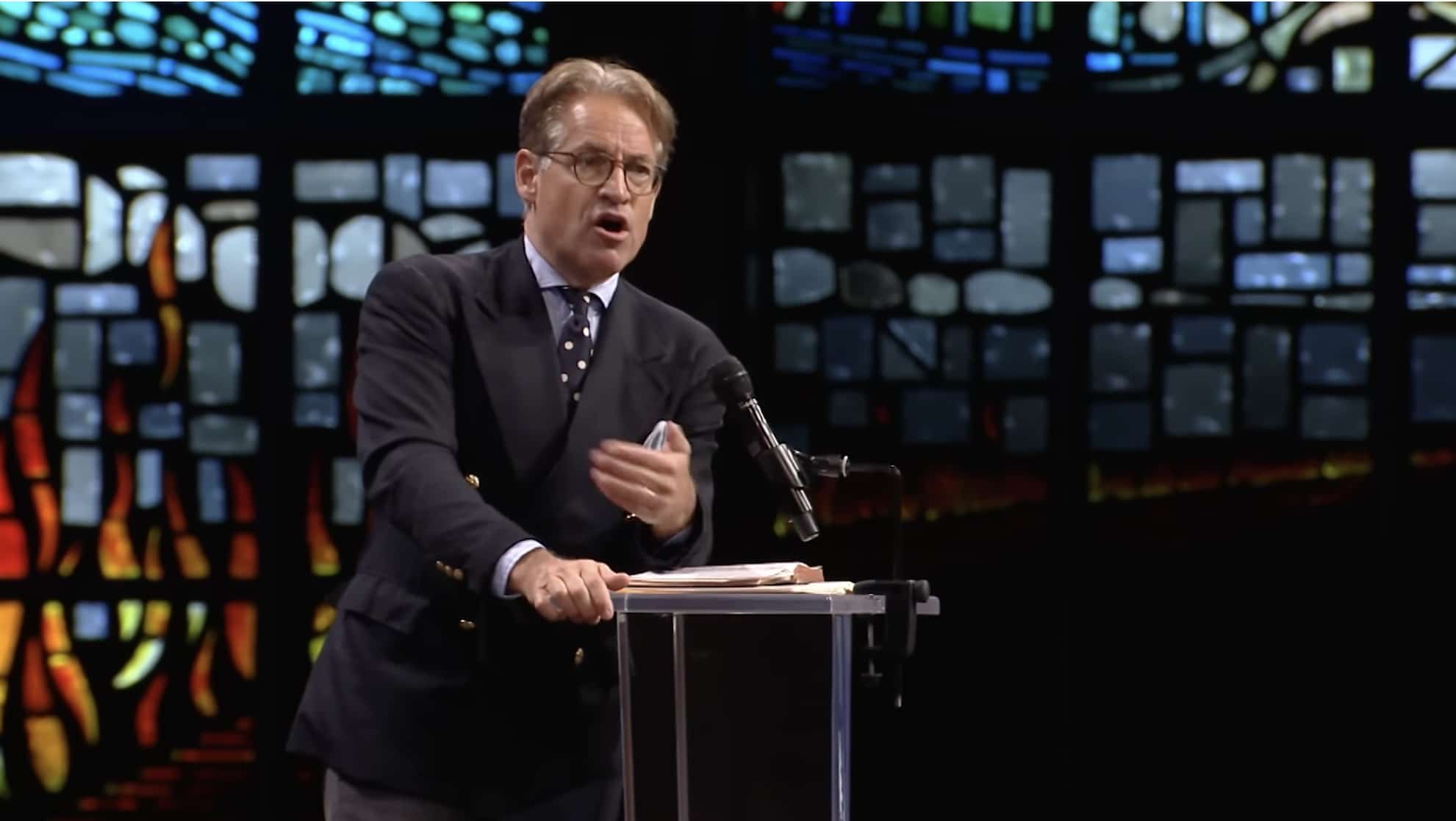Pages 6-10 —
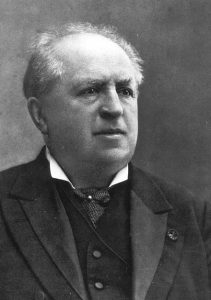
[6] The late, great Chuck Colson rarely gave a speech in which he did not quote a certain statement of the Dutch statesman and theologian Abraham Kuyper. “There is not one square inch,” Kuyper said in 1880, “in the whole domain of our human existence over which Christ, who is Sovereign, does not cry, ‘Mine!'” Kuyper himself, in
[7] being both a statesman and a theologian, obviously lived out this idea. Thinking we would keep our faith in some religious or theological corner is—as we say—preposterous. But the reason Colson quoted Kuyper as often as he did was because the contrary idea had begun to find purchase in some Christian circles.

Part of this may be traced back to the 1960s, when the U.S. Supreme Court took prayer out of the public schools—but the problem is less this specific action than what it represented and portended. It was part of a general trend down a path that was fundamentally mistaken in its views of Jefferson’s famous “wall of separation” between church and state. Rather than protecting people of faith from government intrusion, as the Founders intended—which is of course the central idea of what we call religious liberty—the judiciary instead began to interpret it to mean that the public square should be stripped of faith entirely. The Reverend Richard John Neuhaus famously called this the creation of “the naked public square” [in 1984 he wrote a book with that title, The Naked Public Square: Religion and Democracy in America], which was the perfect opposite of the Founders’ intentions. And it must be said emphatically that to secularize the public square is actually to impose upon it a religion of another kind, albeit in a way that very cleverly and dishonestly pretends not be religious at all. But on matters that touch on the fundamentals of human existence, especially with regard to such institutions as marriage and the sanctity of life, we are inescapably dealing with religious issues. So to stand against the views of people of faith is—quite ironically but unavoidably—to take a distinctly “religious” view nonetheless, and to seek to impose it. And so the Supreme Court and the federal government, which are expressly forbidden from putting a thumb on the scales—but who are to allow the American people to exercise their wills and to have freedom in all things—began to impose secular views. The
[O]n matters that touch on the fundamentals of human existence, especially with regard to such institutions as marriage and the sanctity of life, we are inescapably dealing with religious issues.
—Eric Metaxas—
 [8] justices did this most infamously when in 1973 they purported to discover in the Constitution a “right to abortion,” where of course none existed or ever could exist. In the decades since that time, they continued to drift farther beyond their ordained judicial orbit and have sometimes legislated unconstitutionally from the bench. So because the American people did not sufficiently see the dangers of this, and because Christian leaders did not speak out boldly, the drift toward an unconstitutional and secular view began to be enshrined in our laws and in our culture.
[8] justices did this most infamously when in 1973 they purported to discover in the Constitution a “right to abortion,” where of course none existed or ever could exist. In the decades since that time, they continued to drift farther beyond their ordained judicial orbit and have sometimes legislated unconstitutionally from the bench. So because the American people did not sufficiently see the dangers of this, and because Christian leaders did not speak out boldly, the drift toward an unconstitutional and secular view began to be enshrined in our laws and in our culture.
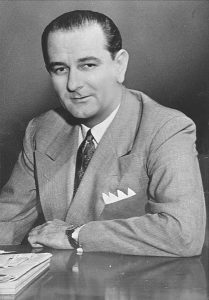
We must also go back to the mid-1950s to understand what happened. It was 1954 that then-Senator Lyndon Johnson introduced an amendment to the U.S. tax code prohibiting churches—and any other non profit organizations—from taking a public stand on political candidates. If anyone from a pulpit dared to endorse a candidate, that church’s tax exemption would be repealed. It is astonishing that pastors in America allowed this wild idea to go uncontested. In this they behaved rather like many of the submissive pastors in Germany two decades earlier. Of course, for American pastors to submit meekly to anything like this is far more shocking, given our own history of religious liberty and freedom of speech.
As a result of these and other events, a pall was cast over many churches, and faith over time began to be “privatized”—to recede from the public sphere and from being applied to issues that went beyond mere theology and personal pietism; and this erroneous view became increasingly normalized. But it is an inescapable and painful fact: if the churches in America are not free to speak on any topic and in any way that they choose—and if they voluntarily go along with this view—then no one in America is truly free, and America herself has effectively ceased to exist.
We have to see just how outrageous it is that this has indeed happened. How could the government in putting forth the so-called
[9] “Johnson Amendment” dare to draw any lines around what could be said in a sermon—in which God’s own Word is to be delivered? What could conceivably be more deserving of complete freedom than that form—of all forms—of public speech? And if the conscience of the man of God in that pulpit would cause him to speak for or against a candidate, what is that to the U.S. government? In fact, it is none of its business.
If the conscience of the man of God in [the] pulpit would cause him to speak for or against a candidate, what is that to the U.S. government? In fact, it is none of its business.
—Eric Metaxas—
Have we forgotten that pastors in the eighteenth century spoke boldly from their colonial pulpits against the tyranny of King George III, and opposed him by name? Was it not their voices that helped us to gain our freedoms and that helped us to create a Constitution in which all of our freedoms were enshrined in a way that has been the envy of the whole world ever since? Were pastors from their American pulpits in the nineteenth century not allowed to speak against those candidates who expressed racist and pro-slavery views? Did they not even have an obligation to educate their congregations on such things and to encourage them to choose leaders who shared God’s views? Finally, were pastors in the twentieth century not allowed to speak out against candidates who advocated for Jim Crow laws? Do we think they ought to have been?
This is no way for any Christian—much less a pastor—to parse what he may be “allowed” to say, and certainly not from the pulpit. It can only be God—and our consciences guided by Him—that can determine what we should and shouldn’t say. So our total freedom—in and beyond our pulpits—is nonnegotiable. The truth cannot be contained, and certainly not in categories that have been arbitrarily chosen and defined by others. So when did these pernicious ideas come into American churches?
[O]ur total freedom—in and beyond our pulpits—is nonnegotiable. The truth cannot be contained, and certainly not in categories that have been arbitrarily chosen and defined by others.
—Eric Metaxas—
Perhaps the more important question is: why did Christian leaders submit to these un-Christian and un-American ideas? And why are they submitting to them today? Have so many pastors today really
[10] forgotten that it is God who calls them to their posts, and God who fills their churches and keeps them filled? Have they forgotten what the Scriptures say: that if they honor God, He will honor them? [1 Sam. 2:30]. Has keeping an eye on the bottom line and on the numbers in attendance caused them to drift away from the very reason God called them to the pulpit in the first place? Have they become like the leaders of American corporations, who have become especially cowardly and seem willing to say and do whatever someone advises them is necessary to avoid trouble and keep them from being “cancelled”?
Have the blessings we have in America made us so comfortable and so soft that we have forgotten that God expects us to serve Him with everything we have, and that if we are in leadership, He requires us to understand that our greater position of authority comes with even greater expectations? [James 3:1]. Of course, many American pastors probably never had this kind of heroic faith to begin with. And there are some who once had it, but who over time have lost their first love and drifted to that awful point at which they are in danger of judgment, just as the Germans Christians in the 1930s and just as the Christians in Ephesus in the first century were.
Will those among us who have lost our first love repent before it’s too late?
Page 84 —
 Our responsibilities as Christians go beyond mere “evangelism.” We pretend we would have spoken out for the Jews in Bonhoeffer’s day, or that we would have spoken against the slave trade in Wilberforce’s day, but are we speaking out today on the issues that are no less important to God in our time? If not, we are deceiving ourselves. But God is not deceived.
Our responsibilities as Christians go beyond mere “evangelism.” We pretend we would have spoken out for the Jews in Bonhoeffer’s day, or that we would have spoken against the slave trade in Wilberforce’s day, but are we speaking out today on the issues that are no less important to God in our time? If not, we are deceiving ourselves. But God is not deceived.
On what issues are we ourselves being silent, and for what reasons? The unborn are being murdered and their body parts sold for profit. Are we not to mention this for fear of driving someone away from God? Or do we ourselves not quite believe or wish to believe it?
Very young children in schools are being fed pernicious ideas on the subject of sexuality—ideas with which their young minds are quite unable to cope, and to which their own parents object.
Older children are being so confused by sexual activists that they agree to have their bodies mutilated, so that they can never become the men and women God created them to be.
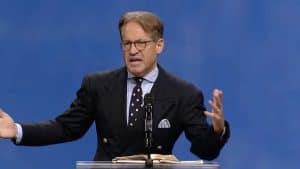
Socialistic and communistic ideas are being pushed everywhere. These will end up harming the poor more than anyone, although those pushing these ideas boldly spread the lie that any who oppose these wicked ideas secretly hate the poor.
Are we really to keep silent about all of these things? Is it not possible that those whom we wish to evangelize are looking to us in the Church—who claim to have no fear but of God—to speak boldly on these things and fight for the truth as we see it while there is yet time? Is this not perhaps the very thing that will lead these souls to the God we worship, if we obviously so love Him that we are willing to live in this way?
Page 91 —
We are obliged to wonder: Where are all of the leading American pastors today on the issues of sexuality and transgender madness? Are they afraid to speak? Do they not know that God has appointed them to speak on these issues fearlessly—as though He really has defeated death on the Cross and has freed them to do His will and share His love, come what may?
The first pages of Genesis declare that God created us male and female in His image. Can anything be simpler? Not to aver this at a time when it is being madly challenged—to the detriment of millions of souls—is to be silent in the face of evil, and therefore to partake in evil. Everyone in the world knows that a rooster cannot lay an egg and that a man cannot have a womb—and cannot menstruate or give birth or lactate or be a mother. But who will say it? Who will help lead the way through the carnage of this ideological warfare? Who will hold up the battle standard—which is Jesus Himself—so that others can see and follow?
The first pages of Genesis declare that God created us male and female in His image. Can anything be simpler? Not to aver this at a time when it is being madly challenged—to the detriment of millions of souls—is to be silent in the face of evil, and therefore to partake in evil.
—Eric Metaxas—
Young women dedicate their whole beings to athletic excellence, only to be roughly shoved aside in what ought to be their long-awaited moment of triumph by a man who, to the applause of a hopelessly confused and broken culture, claims suddenly to be a woman. A young man is confused about his sexuality, but he only hears one message: that he must seize and celebrate his same-sex attractions as a gift from God. Is your pastor talking about these things? Are you?
Page 96 —
We mustn’t make an idol out of any good thing, and of course that includes politics. Chuck Colson often made this point by saying that Jesus was not returning to us on Air Force One, which is true. But where did the Church ever get the idea that it was possible to avoid being political at all?
Certainly William Wilberforce didn’t give the Church the idea that avoiding politics was the “Christian” thing to do. In fact, Wilberforce’s life and work uphold the opposite principle: that politics is God’s arena too, and the Lord’s work can be accomplished there as well as in other arenas of life. — BNS
As we have said, not to stand against slavey in Wilberforce’s time would have certainly been against God’s will, but to stand against it meant being decidedly political. There is no way around it. Doing God’s will sometimes entails entering the world of politics., whether we wish to or don’t. Standing up for the unborn or for any persecuted group will likely mean being somehow political. So when God’s enemies shout that we mustn’t be political, as though this constitutes some trump card that can be used against those who claim to be Christians, we are obliged to hear in these cynical cries the voice of the devil, who similarly tried to keep Wilberforce from doing God’s will through politics and who has tried to keep God’s people from doing good at many times in history. At each of these junctures some Christians have fallen for this ploy and have allowed themselves to be silenced and neutralized, to the great harm of many of their fellow human beings—just as is happening today.
Pages 99-100 —
[99] [W]hat about us? Haven’t we in the American Church…been…silenced from speaking and acting boldly against what we see happening in our own time if what we say and do is characterized as “political”? How else can we have allowed things to get to the point where they now are in American society?
We are obliged to speak up despite whether the wider culture applauds or denounces us. When patriotic Americans are unfairly demonized as “white supremacists,” are we not obliged to stand up for them just as we are obliged to stand up for those victims of racism in our past? Can we pretend that God is a respecter of persons, or that He is not colorblind and will look the other way when we only defend those whom secular elites deem it fashionable to defend? Shall we not be ashamed of ourselves for being silent when any injustices are allowed to persist because of our fear and silence?
There are currently a host of grave matters that require our attention and for which we will almost certainly be attacked by secular and political foes as being political, and for which many within the Church will attack us for not being focused on “the Gospel” when we raise them. For example, the Church has always held that life in the mother’s womb is sacred. This is a nonnegotiable, and when the government makes a law declaring the murder of the unborn child legal, it is not possible for the Church to remain silent. The Church has always known and always held that marriage is a sacred institution, created by God for a man and a woman. When the state attempts to redefine marriage, it is the Church’s solemn duty to speak out against this immoral and unnatural law and not to accede to the accusations that we are being bigoted or unloving in so doing. On the contrary, we are obliged for the love of God and our fellow man to say what the Bible says and what the Church has for all of its history taught.
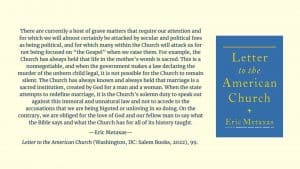
[100] The Church has always known and held that sex is made for marriage, and that when God created mankind in His image, He created us male and female. When the state attempts to upend this eternal order, it is the Church’s duty to speak out. Has your pastor spoken out on these issues so that those in the congregation and beyond know that he is not silently assenting to the sweeping changes being proposed? Speaking the truth of God for His purposes is simply our duty. It is not extra-credit Christianity; it is basic Christianity. Actually, it is simply Christianity.
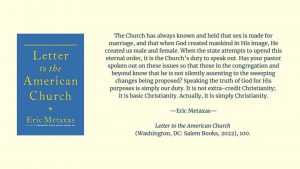
Page 101 —
In the end, we must only worry about what God thinks of what we say. We must look to Him and to Him alone — else we are in no wise free, but are in bondage to the spirit of the age in which we live. So if someone attacks us for being political, we must cheerfully ignore their criticism. To allow the voices of this world to silence us in this way is precisely how the German Church was silenced.
If someone attacks us for being political, we must cheerfully ignore their criticism. To allow the voices of this world to silence us in this way is precisely how the German Church was silenced.
—Eric Metaxas—
Page 101-102 —
[101] Jesus knew that it was ultimately a spiritual battle, and that we must expect to be criticized and reviled—and to be hated. For they hated Him first. So when we are criticized and called names, we should praise God, who allows us to participate in what He is doing on our planet in our time. We do not deserve this extraordinary
[102] honor, but God Himself has graciously given it to us—to you and to me. Shall we decline to accept it?
Pages 104-105—
[104] Many of those who are outside the Church see the injustice and madness and know they must fight it—and they are fighting it. They see that these forces want to wipe away the distinctions between men and women, to wipe away any semblance of clarity about sexual behavior and to introduce alien sexual ideas to our children, and they know something is wrong. They do not need to attend church or to read the Bible to see these things.
They have seen that half-mad abortion activists are widely keening about the “right” to kill children in the womb as though this were a sacred and a good thing, and have witnessed all kinds of powerful forces in government, media, Big Tech, and Big Pharma attempting to silence anyone who dares to voice any disagreement with what these radical elites have declared as the only opinions worth allowing. They have seen these elites not just cancel those who disagree, but have seen them demonize anyone who does not agree with them loudly enough. They see an astonishing attack on the values and virtues most Americans cherish—not merely serious Christians, but many devout Jews and Muslims, and many too who rarely mention God. These people are somehow not crippled into silence and inaction by the strange “theology” of many Christians, and so they are leading the way, bravely speaking up and taking the slings and arrows that come with doing so.

That’s because truth is truth. There is no “Christian truth.” All truth is God’s truth, and sometimes it is those who are not bound up and crippled by entangling and confused “religious” views who who can see most clearly. They have no strange theological ideas hindering them from speaking out about what they see. They have never been told they mustn’t say that the emperor has no clothes—and so they
[105] say so, blissfully unaware that some mistakenly believe Romans 13 makes silence on this and other issues the only safe biblical option.
Pages 107-108
[107] [W]hen we follow God,
[108] we risk the pain of other kinds of deaths before our physical death. For example, we may risk being misunderstood or even vilified by those we have known as allies, or even our dearest friends. As ever, Jesus is the premier example in this, being betrayed in His darkest hour by the man with whom he had spent nearly every day of the previous three years, Judas Iscariot—who not only delivered Him to His enemies and tormentors, but did so with a kiss.
In the end, we are alone with God and His judgment of us. Is God enough?
And what is God asking us to do? What does he think of what we are doing or not doing, or saying or not saying? These are the questions. Is what He thinks enough, or must we have the approval of those others too? Are we willing to pay such a steep price? Or shall we hang back?
Eric Metaxas, Letter to the American Church (Washington, DC: Salem Books, 2022).
Letter to the American Church, an address given at the Second Baptist Church in Houston Texas, Woodway Campus (embedded above), and West Campus
